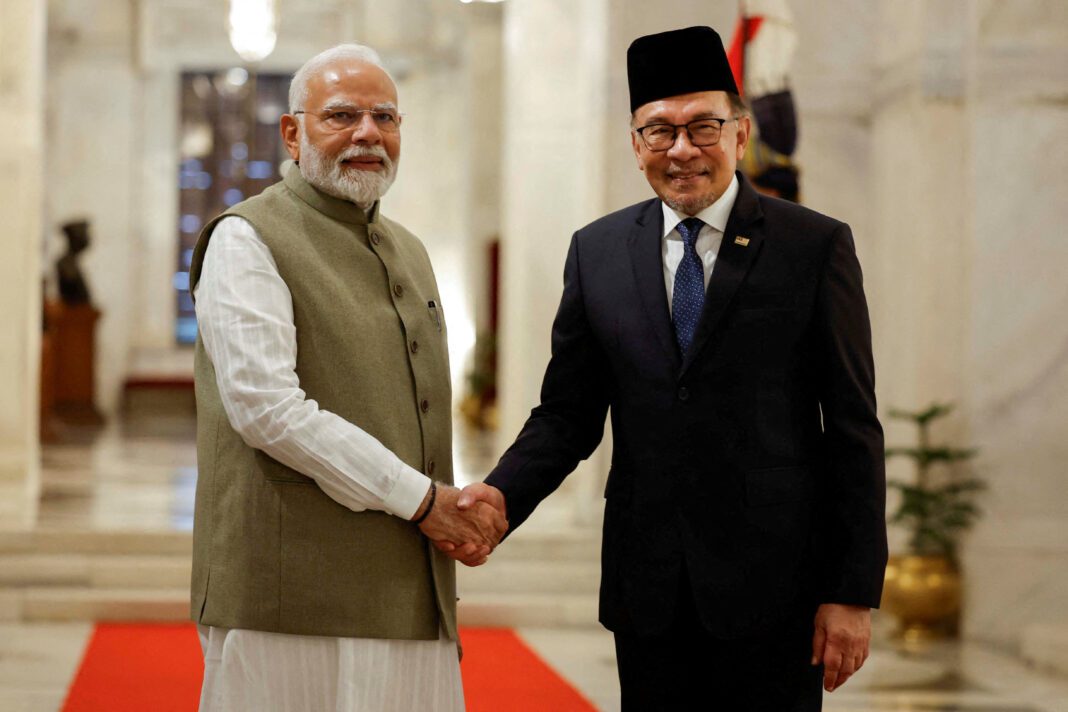India and Malaysia have taken their bilateral relationship to the next level. On Tuesday, Indian Prime Minister Narendra Modi and Malaysian Prime Minister Anwar Ibrahim announced the elevation of their ties to a Comprehensive Strategic Partnership. The two leaders discussed expanding cooperation into new and crucial fields, including digitalisation, defense manufacturing, semiconductors, and artificial intelligence (AI).
Strengthening Economic Cooperation
India and Malaysia are deepening their friendship. Last year, Malaysia invested $5 billion in India. This shows their trade is growing. Leaders Modi and Ibrahim want to explore new areas. They’re interested in fintech, defense industries, AI, and quantum tech. Modi believes there is still more potential. He wants to see more trade and investment between the two countries.
A Landmark MoU on Worker Recruitment
One of the most important agreements signed between India and Malaysia was about the recruitment and working conditions for Indian workers in Malaysia.This is a big deal because ongoing concerns have existed about how Malaysia treats Indian workers. Currently, about 185,000 Indian nationals work in Malaysia, doing various jobs.
This new agreement is designed to protect these workers and make sure they are treated fairly. It focuses on ensuring that Indian workers have good working conditions and that their rights are respected. Prime Minister Modi believes that this agreement will not only help more Indians find jobs in Malaysia but also make sure that they are treated well and their interests are protected.
Simplifying Visa Procedures
In a move to facilitate the movement of people between the two nations, India and Malaysia have agreed to simplify visa procedures. This step will boost tourism, business travel, and exchanges between people. It will further strengthen the bond between the two multicultural and multi-religious countries.
Focus on Digital Cooperation
Digital technology emerged as a key area of collaboration between India and Malaysia. The two sides agreed to work on connecting India’s Unified Payments Interface (UPI) with Malaysia’s Payments Network (PayNet) to enhance digital transactions between the two countries. A Digital Council will foster cooperation in digital technology, and a Startup Alliance will support innovation and entrepreneurship.
Expanding Cooperation in Various Fields
The two countries signed several other agreements to deepen cooperation across various sectors. These include:
– Tourism:Promoting mutual tourism and cultural exchanges.
– Youth Affairs and Sports: Enhancing collaboration in sports and youth development programs.
– Public Administration and Governance Reforms: Sharing best practices in governance and public administration.
– Ayurveda and Traditional Medicine: Encouraging the use of traditional medicine and wellness practices.
– Culture, Arts, and Heritage: Strengthening cultural ties through arts and heritage programs.
Defense and Security Cooperation
India and Malaysia also explored new possibilities for mutual cooperation in the defense sector. Both countries expressed their commitment to working together in joint military operations to safeguard their borders. They reaffirmed their shared stance against terrorism and extremism, emphasizing the need for collaboration to maintain regional peace and security.
Commitment to the Indo-Pacific Region
India sees Malaysia as an important partner within the ASEAN framework and in the Indo-Pacific region. Modi reiterated India’s commitment to ensuring freedom of navigation and overflight in accordance with international laws. He also emphasized the peaceful resolution of disputes in the region, underlining the importance of maintaining stability and security.
Looking Ahead
These new agreements and initiatives will make the India-Malaysia partnership grow even stronger. Ibrahim thanked India for its friendship, calling it “reciprocal” and pledged to reinvigorate working relations in all fields. As both nations look forward to deeper collaboration, the Comprehensive Strategic Partnership marks a new chapter in their bilateral ties, promising a brighter future for both countries.

